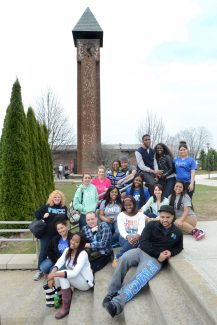Commitment to Diversity, Equity & Inclusion

Diversity, Equity, and Inclusion Vision Statement
SUNY FMCC strives to represent and embrace students, faculty and staff from a variety of cultures and backgrounds and celebrate all people in a dynamic and inclusive culture. SUNY FMCC will be the multicultural center of the community it serves.
Non-Discrimination Policy can be located here.
Diversity, equity, and inclusion are defining features of Fulton Montgomery Community College’s past, present and future. Increasing the diversity of our students and staff to better reflect the populations we serve is critical to Fulton-Montgomery Community College’s mission as a public institution, and imperative to achieving its full potential. Diversity entails an appreciation and celebration of our differences and a recognition of how our uniqueness strengthens learning and work experiences at our College. Such differences can include, but are not limited to, race, ethnicity, abilities/disabilities, sexual orientation, nationality, veteran status, geographic region, gender, age, religious beliefs and socio-economic status. Our commitment to diversity and inclusion is founded in principles of respect, as well as promoting a positive, safe and welcoming environment.
- Strengthen partnerships with the local community to promote diversity and inclusion.
- Raise profile of Campus diversity efforts and accomplishments by building upon multicultural programming.
- Provide cultural competency, diversity training, and mentoring opportunities to staff and students.
- Improve minority representation of faculty and staff to better reflect FM’s student population.
- Increase diversity of our student population.
- Increase our student retention and completion rates of underrepresented students.
- Enhance the curriculum to further infuse diversity, inclusion, and civility themes into our course offerings and co-curricular activities.
The Council on Diversity, Equity, and Inclusion meets monthly to discuss topics of relevance and move the college forward with our efforts on this important topic. We fully participated in the State University of New York’s 64 x 64 campaign by identifying the following initiatives:
Faculty developed a micro-credential program in three areas for students studying in the academic program of General Studies: Individual Studies and developed micro-credentials applications or badges. This micro-credential sequence is structured to prepare students for the increasing expectations of diverse workplaces and/or transfer to four-year institutions to continue studies in Sociology or Multi-Cultural studies. This sequence provides a foundation for students who would like to pursue careers in sociology, diversity and inclusion, or multi-cultural affairs. Students will have the opportunity to explore how race, social status, gender, religion, and sexual orientation influence social justice and learn evidence-based approaches to mitigate structural violence and create just and equitable environments.
Names of Badges Developed and Learning Outcomes:
- Society and Human Rights. A successful student who acquires this badge through coursework in this area will demonstrate knowledge of the major concepts, models, and issues of human rights, and an understanding of what constitutes human rights violations and strategies to address human rights violations. Students will also understand the methods social scientists use to explore social (human rights) phenomena, including observation, hypothesis development, measurement and data collection.
- Multiculturalism and Diversity. A successful student who acquires this badge through coursework will be able to explain multicultural concepts related to race, social class, gender, religion, and sexual orientation and will be able to analyze how race, social class, gender, religion, and sexual orientation impact social justice. Further, students will demonstrate and analyze who race, social class, gender, religion, and sexual orientation impact social justice.
- Compassionate Communication and Action. Students acquiring this badge will come away with the ability to identify and apply the concepts of human rights and multiculturalism and understand their interdependence with environmental rights as well as demonstrate effective communication skills such as active listening, empathy, compassion, civility and conflict resolution. Finally, the student will have the ability to apply multicultural best practices of equity, justice, compassionate communication, and human rights advocacy methods utilized to affect social change.
For more information on diversity, equity, and inclusion on campus contact Chief Diversity Officer, Flor Trespalacios, Ph.D.,
